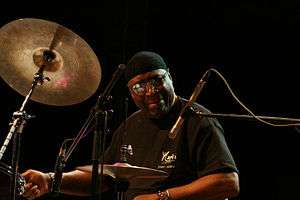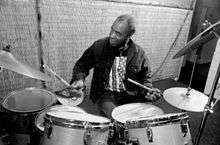Rashied Ali
| Rashied Ali | |
|---|---|
 | |
| Background information | |
| Birth name | Robert Patterson |
| Born |
July 1, 1933 Philadelphia, Pennsylvania, United States |
| Died |
August 12, 2009 (aged 76) New York City, New York United States |
| Genres | Jazz |
| Occupation(s) | Musician |
| Instruments | Drums |
| Years active | 1963–2009 |
| Labels | Tzadik |
| Associated acts | John Coltrane, Phalanx |
| Website |
rashiedali |
Rashied Ali, born Robert Patterson (July 1, 1933 – August 12, 2009[1]) was an American free jazz and avant-garde jazz drummer best known for playing with John Coltrane in the last years of Coltrane's life.[2]
Biography

Early life
Patterson was born and grew up in Philadelphia, Pennsylvania; his family was musical: his mother had sung with Jimmie Lunceford.[3] His brother, Muhammad Ali, is also a drummer, who played with Albert Ayler, among others. Ali, along with his father and brother, converted to Islam.[4]
Starting off as a pianist he eventually took up the drums, via trumpet and trombone.[5] He joined the United States Army, and played with military bands during the Korean War.[5] After his military service he returned home and studied with Philly Joe Jones.[5]
Career
Ali moved to New York in 1963 and worked in groups with Bill Dixon and Paul Bley.[6] In addition, Ali was scheduled to be the second drummer, alongside Elvin Jones, on John Coltrane's landmark free jazz album Ascension, but he dropped out just before the recording was to take place.[5] Coltrane did not replace him, and settled for one drummer. Ali began to record with Coltrane from Meditations in November 1965 onwards.
Among his credits are the last recorded work of John Coltrane's life (The Olatunji Concert) and Interstellar Space, an album of duets with Coltrane recorded earlier in 1967. Ali "became important in stimulating the most avant-garde kinds of jazz activities".[7] Following Coltrane's death Ali played with his widow, Alice,[5] and during the early 1970s, he ran Ali's Alley, an influential loft club in New York.[8] He spent some time as a visiting artist at Wesleyan University, sponsored by Clifford Thornton. Ali also briefly formed a non-jazz project called Purple Trap with Japanese experimental guitarist Keiji Haino and jazz-fusion bassist Bill Laswell. Their double-CD album, Decided...Already the Motionless Heart of Tranquility, Tangling the Prayer Called "I", was released on John Zorn's Tzadik Records label in March 1999.
In the 1980s, he was member of Phalanx, a group with guitarist James "Blood" Ulmer, tenor saxophonist George Adams, and bassist Sirone. From 1997 – 2003 he played extensively with Tisziji Munoz, in a group that usually also included Pharoah Sanders.
Though most known for his work in the jazz idiom, Rashied Ali also made his contributions to other experimental art forms including multi-media performances with The Gift of Eagle Orchestra and Cosmic Legends. Performances such as Devachan and the Monads, Dwarf of Oblivion, which took place at the Kitchen Center for Performance Art, and a special tribute to John Cage in Central Park, have taken performance art to new levels with the addition of fully improvised large scale performance pieces. Other artists of the orchestra and Cosmic Legends have included Hayes Greenfield (sax), Perry Robinson (clarinet), Wayne Lopes (guitar), Dave Douglas (trumpet), Gloria Tropp (vocals), director/pianist Sylvie Degiez along with poets and actors Ira Cohen, Taylor Mead and Judith Malina (Living Theater).
Later life
In the last years of his life, Rashied Ali led his own eponymous quintet. A double CD entitled Judgment Day was recorded in February 2005 and features Jumaane Smith on trumpet, Lawrence Clark on tenor sax, Greg Murphy on piano and Joris Teepe on bass. This album was recorded at Ali's own Survival Studio, which has been in existence since the 1970s. In addition to his performance activities Ali served as mentor to numerous young drummers including Matt Smith.
In 2007, Ali recorded "Going to the Ritual" in duo with bassist/violinist Henry Grimes (Porter Records PRCD-4005), with a second duo recording in post-production at the time of Ali's death. Ali and Grimes also played five duo concerts together between 2007 and 2009, and a sixth concert in June 2007 with pianist Marilyn Crispell. Ali is the featured drummer on Azar Lawrence's album Mystic Journey, recorded in April 2009 and released in May 2010.
Rashied Ali died at age 76 in a Manhattan hospital after suffering a heart attack.[9][10] He is survived by wife Patricia and three children.
Discography
As leader
- 1971 – New Directions in Modern Music (Survival Records, reissued by Knit Classics) with Carlos Ward, Fred Simmons, Stafford James
- 1972 – Duo Exchange (Survival Records, reissued by Knit Classics) with Frank Lowe
- 1973 – Swift Are The Winds of Life (Survival Records, reissued by Knit Classics) with Leroy Jenkins
- 1973 – Rashied Ali Quintet (Survival Records, reissued by Knit Classics) with James "Blood" Ulmer
- 1974 – Moon Flight (Knitting Factory)
- 1975 – N.Y. Ain't So Bad (Survival Records, reissued by Knit Classics)
- 1989 – Rashied Ali in France (Blue Music Group)
- 1994 – Peace on Earth: The Music of John Coltrane (Knitting Factory Works) with Prima Materia and guests John Zorn, Allan Chase
- 1995 – Meditations (Knitting Factory Works) with Prima Materia, including Greg Murphy
- 1995 – Bells (Knitting Factory Works) with Prima Materia
- 1999 – Rings of Saturn (Knitting Factory Works), duets with tenor saxophonist Louie Belogenis
- 2000 – Live at Tonic (DIW) with Wilber Morris
- 2008 – Going to the Ritual (Porter Records) with bassist Henry Grimes
- 2009 – at the Vision Festival with Greg Tardy, James Hurt, Omer Avital. (Blue Music Group)
- 2009 – Eddie Jefferson at Ali's Alley with Eddie Jefferson (Blue Music Group)
- 2009 – Configurations, the Music of John Coltrane with Prima Materia (Blue Music Group)
- 2009 – Cutt'n Korners with Greg Tardy, Antoine Drye and Abraham Burton. (Blue Music Group)
- 2010 – Spirits Aloft (Porter Records) with bassist Henry Grimes
As sideman
With Gary Bartz
- Home! (Milestone, 1970)
With Peter Brötzmann
- Songlines (1991)
With Michael Bocian
- "Go Groove"" (1991)
With Marion Brown
- Marion Brown Quartet (1966)
- Why Not? (1967)
With John Coltrane
- Meditations (Impulse!, 1965)
- Live in Japan (Impulse!, 1966)
- Live at the Village Vanguard Again! (Impulse!, 1966)
- Interstellar Space (Impulse!, 1967)
- Stellar Regions (Impulse!, 1967)
- Expression (Impulse!, 1967)
- The Olatunji Concert: The Last Live Recording (Impulse!, 1967)
- Cosmic Music (Impulse!, 1968)
With Charles Gayle
- Touchin' on Trane (FMP, 1991 [1993])
With Jackie McLean
- 'Bout Soul (Blue Note, 1967)
With Tisziji Munoz
- The River of Blood (Anami Music, 1997)
- Present Without A Trace (Anami Music, 1997)
- Spirit World (Anami Music, 1997)
- Presence of Truth (Anami Music, 1999)
- Presence of Joy (Anami Music, 1999)
- Presence of Mastery (Anami Music, 1999)
- Breaking the Wheel of Life and Death (Anami Music, 2000)
- Parallel Reality (Anami Music, 2000)
- The Hu-Man Spirit (Anami Music, 2001)
- Shaman-Bala (Anami Music, 2002)
- Divine Radiance (Anami Music, 2003)
- Divine Radiance Live! (Anami Music, 2013)
- Paul Shaffer Presents: Tisziji Muñoz - Divine Radiance Live! DVD (Anami Music, 2013)
- Sky Worlds (Anami Music, 2014)
With David Murray
- Body and Soul (1993)
With Phalanx
- Original Phalanx (1987)
- In Touch (1988)
With Alice Coltrane
- A Monastic Trio (1968)
- Journey in Satchidananda (1970)
With Alan Shorter
- Orgasm (Verve, 1968)
References
- ↑ William Grimes "Rashied Ali, Jazz Drummer, Dies", New York Times, August 13, 2009
- ↑ Cook, Richard (2005). Richard Cook's Jazz Encycolpedia. London: Penguin Books. p. 7. ISBN 0-141-00646-3.
- ↑ Wilmer, Valerie (1977). As Serious As Your Life: The Story of the New Jazz. Quartet. p. 259. ISBN 0-85031-224-8.
- ↑ "Encyclopedia of Jazz Musicians". Jazz.com. Retrieved 2011-10-01.
- 1 2 3 4 5 Grimes, William (August 14, 2009). "Rashied Ali, Free-Jazz Drummer, Dies at 76". The New York Times. Retrieved January 24, 2012.
- ↑ Wilmer, Valerie (1977). As Serious As Your Life: The Story of the New Jazz. Quartet. p. 171. ISBN 0-85031-224-8.
- ↑ Litweiler, John (1984). The Freedom Principle: Jazz After 1958. Da Capo. p. 104. ISBN 0-306-80377-1.
- ↑ Ron Wynn, ed. (1994), "Venues", All Music Guide to Jazz, M. Erlewine, V. Bogdanov, San Francisco: Miller Freeman, ISBN 0-87930-308-5
- ↑ "R.I.P. Rashied Ali (1935–2009)". Inlog.org. August 13, 2009. Retrieved 2011-10-01.
- ↑ "Le batteur de jazz Rashied Ali est mort". fr: Citizenjazz.com. Retrieved 2011-10-01.